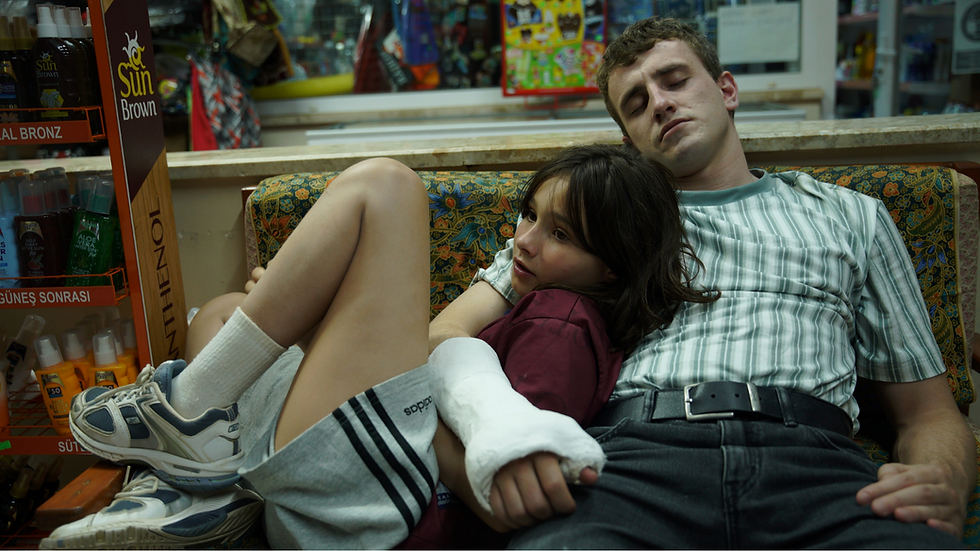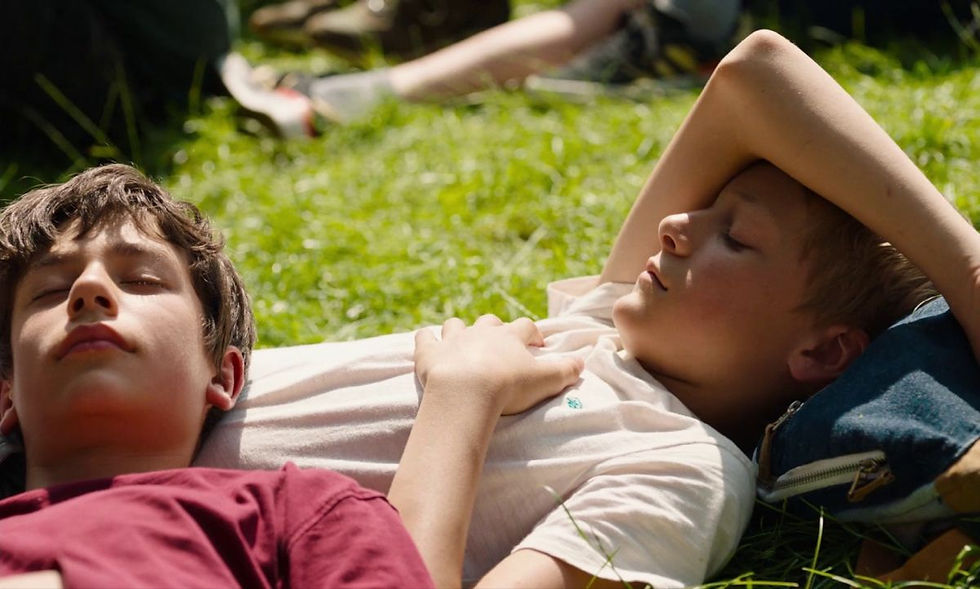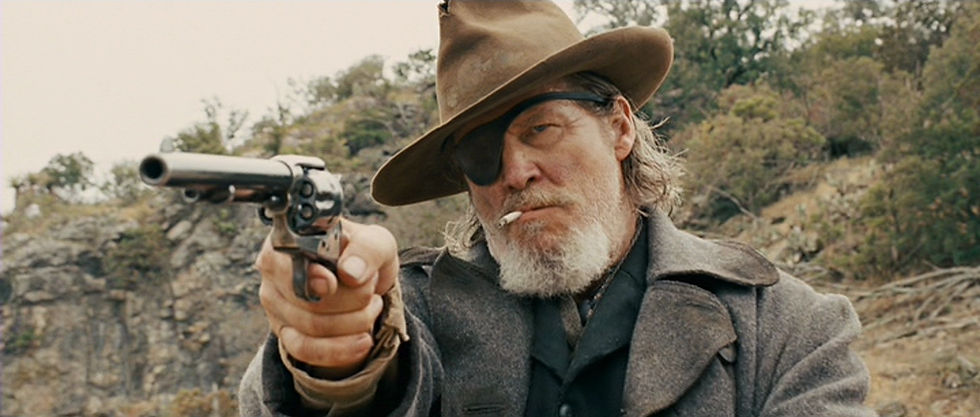Lovers Rock (2020) dir. Steve McQueen
- Harry Scott
- Jan 10, 2021
- 6 min read
Updated: Mar 8, 2023

Directed By Steve McQueen
Released
22 November 2020
Small Axe is artist and director Steve McQueen’s anthology of stories about the West Indian community in London in the ’60’s, ’70’s and 80’s. Arguably one of Britain’s best working directors, Small Axe follows Steve McQueens retrospective at the Tate, his first exhibition there since he won the coveted Turner prize in 1999 for Deadpan 1997 and video installation Drumroll 1998. Lovers Rock, is the second instalment of the anthology, and alongside Mangrove, was selected for Cannes’ Official Selection and made McQueen the first director in history to have two films selected in the same year.
First conceived as a TV series by McQueen after the release of his debut film Hunger, a drama about Bobby Sands and the 1981 Irish hunger strikes, McQueen over time slowly realised this story would be best told as a collection of films. Talking to Emily Zemler, McQueen described Small Axe as about “my upbringing and my life and what shaped me.” These stories include the Letitia Wright starring Mangrove, the true story of the 1971 trial of the Mangrove Nine, Red White and Blue, John Boyega’s powerful portrayal of Leroy Logan attempts to reform the institutionally racist metropolitan police from within, alongside Education and Alex Wheatle, two I have yet to see. Named after the post-Windrush fusion of reggae and soul in 1970s Britain, and the only fictional film of McQueen’s anthology, Lovers Rock depicts a house party in 1980s West London set amidst a backdrop of music and romance. The film is cinematically a world away from Mangrove and Red, White and Blue, however, like the others, the film promotes important ideas of black ingenuity and self reliance of which Small Axe (“If you are the big tree, we are the small axe” - even the powerful can be brought down by small acts of resistance) has come to symbolise.
As many were unable to frequent the majority of white dominated nightclubs in London, domesticated and private ‘blues parties’ emerged as an important pillar of West Indian life from the 40s to the 70s. The higher the density of Caribbean immigration to an area, the more blues parties there would be. These were all-night parties in West London terraces with huge sound-systems, where the host would put on massive pots of catering, sell drink and charge a modest entry fee, creating important social spaces for West Indian communities throughout London. Blues parties started off as illegal house parties in basements or rented houses because Caribbean people coming to the UK often found pubs, clubs and working men’s clubs unwelcoming and uncomfortable environments. Unlike their Jamaican or Caribbean counterparts back home, blues parties were often small scale domestic affairs, most notably because it was often too cold or damp to party outdoors in the UK and because (with a few exceptions) people of colour were refused the opportunity to hire pubic spaces for social events. McQueen argued that this in essence is what Small Axe was about saying: “it is about doing it yourself. Don’t worry if people won’t let you in. You make your own.”
Lovers Rock recounts 16 year-old Martha’s (played by debutant Amarah-Jae St. Aubyn) sneaking away from her strict religious family for her first blues party in Ladbroke Grove, where she ultimately crosses paths with Franklyn (played by Top Boy’s Michael Ward). The cliche boy meets girl setup is just a device for McQueen to explore the rupture of music and black joy in these blues parties, and what McQueen describes as “lost histories that haven’t been illuminated, or shared and valued.” Lovers Rock breathes life into an undocumented, often forgotten piece of British history and music, a nod to a lost period of time. As reggae historian and former John Masouri explains, these parties came to prominence due to the abundance of council housing, community centres, church halls and youth clubs, which today are all disappearing in vast numbers thanks to tory austerity measures.
Once the excitement of the initial set up has passed (the struggle of moving sofa’s out, the older ladies of the house laughing and dancing together in the kitchen, that ecstasy when the speakers first kick in) McQueen’s deft touch at gentle filmmaking comes to the fray. The middle act of the film is entirely without plot as the camera slinks around the orange hues of the hazy front room as you would squeezing past people to find your mates or the girl/boy you’ve been thinking about all week. Partygoers melt into each others arms as sweat drips the walls, encapsulating a mood and a feeling which makes you desperate for just one night like this again as the UK enters its third lockdown in less than a year. In this front room, filled with just people and the decks, McQueen covers every possible emotion, from rejection to euphoria, from lust to confrontation, even including the obligatory bloke dropping a fat one in the toilet.
McQueen does gently allude to the discrimination and the structural and societal forces working against the West Indian community in the UK, these blues parties after all were characterised by both joy and struggle. However, unlike the other Small Axe films, these forces are not the focus of the film. These all take part on the periphery of the party, the constant hum of police sirens every time the bouncer opens the door, a group of white boys making monkey noises as Martha chases after Patty outside, Franklyn’s code switching and white-speak as he enters his workplace and the sexual assault by Bammy, emphasising the double burden of prejudice black women face. However, despite the obvious outside forces working against this community, McQueen beautifully demonstrates and focuses on the fact that for this community these parties were a beautiful release.It goes without saying that music transcends the party, used by McQueen as a structural device, the opening excitement and ecstasy characterised by the un-ironic use of “Kung Fu Fighting” (similar to Spike Lee’s needle drop of “Too Late To Turn Back Now” in BlacKkKlansman), whilst the lull and groove of the middle act is soundtracked by Janet Kay’s Silly Games, and the rowdy afters is led by the energetic reloads of "Kunta Kinte Dub.”
The climax of the film comes as the needle drops the first time on Kay’s song, the camera floating around the room, following partygoers as they grip their partners closer, sweat dripping down the walls. When the tune ends, the song doesn’t stop there, the rammed room sings a cappella for five uninterrupted minutes. This culmination was like watching a release unfold in front of you, an escape from white-speak, an escape from the cross that stalks Martha from her home to the man assembling on the green, an escape from the prejudice that forced these parties to flourish. The whole “Silly Games” centrepiece is built around sheer physicality alone, like a dance piece with no words or plot, told through partygoers catching glances across the room, pulling each other closer, grabbing their hand and waist, swaying and signing in unison. This is a safe space, an epitome of black joy rarely painted on TV or on film. “For me, that was an essential part of that party,” McQueen says. “It was about that sort of liberation, that freedom, that spiritual nakedness. That’s what I wanted to see. You don’t see that very much in cinema - of Black people having that total, absolute lack of inhibition.”
Lovers Rock is an ode to the party, told through the lens of a community doing it themselves amid a backdrop of prejudice and discrimination, escaping from the oppression of the weekday. To borrow a quote from Hunter Harris, Lovers Rock “shows what happens when white people aren’t looking - the rupture in black joy.” As the dust settles and Martha sneaks back home as the sun comes out, I felt a strange nostalgia for a party I hadn’t been too in a time I had never lived through with a community I sadly knew little about. It is a complete disservice to this masterpiece that it might never be seen on the big screen and an important antidote to these troubling and often lonely times.
Currently streaming on BBC iPlayer
8/10



Comments